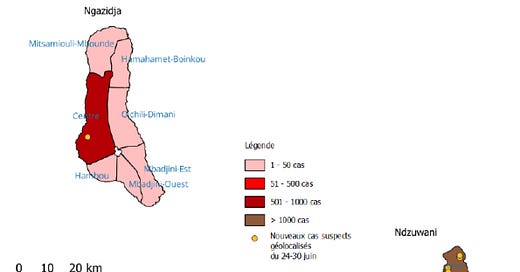In a follow-up on the cholera outbreak in the Comoros, since the declaration of the cholera epidemic on 2 February 2024, and as of 30 June, Comoros has recorded 10,142 suspected cases of cholera and 147 deaths, representing a 1.45% case fatality rate (CFR).
The cholera incidence has been on a decreasing trend for several weeks. Nevertheless, all three islands of Comoros continued to experience local cholera transmission, but with very few cases reported in Grande Comore (Ngazidja) and Moheli (Mwali) during the reporting period, and a decrease in Anjouan (Ndzuwani) in recent weeks.
Anjouan continues to be the epicentre of the epidemic and alone accounted for 8,942 suspected cases (88% of all reported cases in the country) as of 30 June.
Nationally, men and boys account for 54% of all cholera cases. Over 35% of cases are children and adolescents, and 25% are children under 15 years of age. The cholera epidemic continues to pose significant risks to the entire community, with increased potential for transmission as the ‘grand marriage’ season is starting – a social rite that involves large population gatherings
This imported epidemic in the Union of the Comoros has already spread to the neighboring island of Mayotte, where more than 210 confirmed cases and 2 deaths had been reported as of 25 June. There is also a risk of further spread of the epidemic in the region, for example, to Madagascar.
Through a partnership between UNICEF, the Ministry of Health, and the Comorian Red Crescent, 18 Case Area Targeted Interventions (CATI) teams continued to respond across the three islands to prevent further cholera transmission. The teams have reached over 45,000 households with house decontamination and stop cholera kits, and over 185,000 individuals via door-to-door or small group interactions.
Subscribe to Outbreak News TV on YouTube
Risk communication and community engagement (RCCE) efforts have reached 570,000 people with key engagement messages, including 150,000 people reached with direct person-to-person communication. Communication efforts have supported the Ministry of Health’s oral cholera vaccine (OCV) vaccination campaign, reaching 47% of the population vaccinated as of 30 June, with wide variations between islands.
Cholera is an acute diarrhoeal infection caused by ingestion of food or water contaminated with the bacterium Vibrio cholerae. Cholera remains a global threat to public health and an indicator of inequity and lack of social development.





